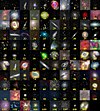NGC 6302
|
Planetary Nebula NGC 6302 |
|
|---|---|

|
|
| Photo from the Hubble Space Telescope | |
| AladinLite | |
| Constellation | Scorpio |
|
Position equinox : J2000.0 |
|
| Right ascension | 17h 13m 44.6s |
| declination | −37 ° 06 ′ 11 ″ |
| Appearance | |
| Apparent brightness (visual) | 9.6 likes |
| Apparent brightness (B-band) | 12.8 mag |
| Angular expansion | 1.48 ′ × 1.48 ′ |
| Central star | |
| designation | HD 155520 |
| Physical data | |
| Redshift | −0.000119 |
| Radial velocity | −35.7 km / s |
| distance | 4000 ly |
| history | |
| discovery | James Dunlop |
| Date of discovery | June 5, 1826 |
| Catalog names | |
| NGC 6302 • PK 349 + 1.1 • ESO 392-PN5 • Sh2-6 | |
NGC 6302 , also known as the Beetle Nebula , is a planetary nebula in the constellation Scorpio , which is 4,000 light years from Earth . NGC 6302 was formed by an aging star named HD 155520 when it shed its outer shell in the form of extremely rapid gas flows over the past 2200 years.
The object was discovered on June 5, 1826 by the American astronomer James Dunlop .
Web links
Commons : NGC 6302 - collection of images, videos, and audio files
- Hubble Space Telescope 2009
- Hubble Space Telescope 2004
- GoBlack
- Image from ESO
- astronews.com: Picture of the day October 8, 2009
- Spektrum.de: Amateur recordings [1]
Individual evidence
- ↑ NASA / IPAC EXTRAGALACTIC DATABASE
- ↑ a b SEDS: NGC 6302
- ↑ SIMBAD
- ↑ Hubble reveals butterfly. In: Spectrum of Science. November 2009, p. 15.
- ↑ Seligman
